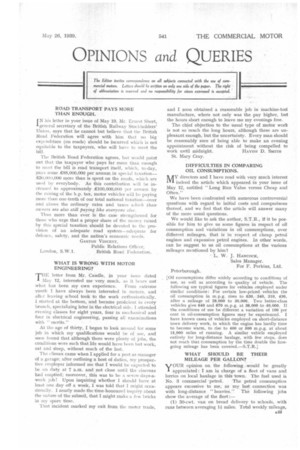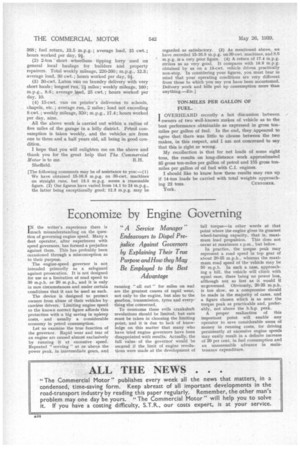OPINIONS and QUERIES The Editor invites correspondence on all subjects
Page 51

Page 52

If you've noticed an error in this article please click here to report it so we can fix it.
connected with the use of commercial motors. Letters should be written on only one side of the paper. The right of abbreviation is reserved and no responsibility for views expressed is accepted.
ROAD TRANSPORT PAYS MORE THAN ENOUGH.
I N his letter in your issue of May 19, Mr. Ernest Short, general secretary of the British Railway Stockholders' Union, says that he cannot but believe that the British Road Federation will agree with him that no big expenditure (on roads) should be incurred which is not equitable to the taxpayers, who will have to meet the bill.
The British Road Federation agrees, but would point out that the taxpayer who pays far more than enough to meet the bill is road transport itself, which, to-day, pays some £88,000,000 per annum.in special taxation— £30,0W,000 more than is spent on the roads, which are used by everybody. As this contribution will be increased to approximately 2100,000,000 per annum by the raising of the h.p. tax, motor vehicles will be paying more than one-tenth of our total national taxation—over and above the ordinary rates and taxes which their owners are also still paying like everyone else.
Thus more than ever is the case strengthened for those who urge that a proper share of the money raised by this special taxation should be devoted to the provision of an adequate road system—adequate for defence, safety, and the nation's economic needs.
GASTON VINCENT, Public Relations Officer, London, S.W.1. British Road Federation.
WHAT IS WRONG WITH MOTOR ENGINEERING?
THE letter from Mr. Caudle, in your issue dated May 12, interested me very much, as it bears out what has been my own experience. From extreme youth I have always been interested in motors, and after leaving school took to the work enthusiastically. I started at the bottom, and became proficient in every branch, specializing later in the electrical side. 1 attended evening classes for eight years, four in mechanical and four in electrical engineering, passing all examinations with " merits."
At the age of thirty, I began to look around for some job in which my qualifications would be of use, and soon found that although there were plenty of jobs, the conditions were such that life would have been but work, eat and sleep, without much of the last.
The climax came when I applied for a post as manager of a garage; after outlining a host of duties, my prospective employer informed me that I would be expected to be on duty at 7 a.m. and not close until the cinemas had emptied; moreover, this was to be a seven days-a. weekjob ! Upon inquiring whether I should have at least one day off a week, I was told that I might occasionally. I nearly made the time-honoured inquiry about the nature of the subsoil, that I might make a few bricks in my spare time.
That incident marked my exit from the motor trade, and I soon obtained a reasonable job in machine-tool manufacture, where not only was the pay higher, but the hours short enough to leave me my evenings free.
The chief objection to the usual type of motor work is not so 'much the long hours, although these are unpleasant enough, but the uncertainty. Every man should be reasonably sure of being able to make an evening appointment without the risk of being compelled to work until midnight. HAYDN D. SMITH St. Mary Cray.
DIFFICULTIES IN COMPARING OIL CONSUMPTIONS.
It TY directors and I have read with very much interest LYI indeed the article which appeared in your issue of May 12, entitled "Long Run Value versus Cheap and Often."
We have been confronted with numerous controversial questions with regard to initial costs and comparisons thereof, and we feel that the article will answer many of the more usual questions.
We would like to ask the author, S.T.R., it be possible for him to give us some figures in respect of oil consumption and variations in oil consumptions, over different mileages, that is in respect of cheap petrol engines and expensive petrol engines. In other words, can he suggest to us oil consumptions at the various mileages mentioned by him?
L. W. J. HANCOCK, Sales Manager.
For F. Perkins, Ltd. Peterborough.
[Oil consumptions differ widely according to conditions of use, as well as according to quality of vehicle. The following are typical figures for vehicles employed under similar conditions: For certain low-priced vehicles the oil consumption in m.p.g. rises to 630, 340, 310, 430, after a mileage of 28,000 to 30,000. Two better-class vehicles give 640 and 870 m.p.g. at 38,000 to 40,000. If the conditions of use be different a variation of 100 per cent in oil-consumption figures may be experienced. I have known cases of vehicles employed on short-distance town delivery work, in which the engine has hardly time to become warm, to rise to 400 or 500 m.p.g. at about 15,000 miles of running. A similar vehicle employed entirely for long-distance haulage, with few stops, does not reach that consumption by the time double the foregoing mileage has been covered.—S.T.Rd
WHAT SHOULD BE THEIR MILEAGE PER GALLON?
YOUR opinion on the following would be greatly appreciated : I am in charge of a fleet of vans and lorries on local haulage in thit town. The fuel used is
No. 3 commercial petrol. .The petrol consumption appears excessive to me, as my last connection was with long-distance "heavies." The following jobs show the average of the fleet:—
(1) 30-cwt. van on bread delivery to schools, with runs between averaging 14 miles. Total weekly mileage, 433 368; fuel return, 13.5 m.p.g. ; average load, 15 cwt.; hours worked per day, 9. (2) 2-ton-short wheelbase tipping lorry used on general local haulage for builders and property repairers. Total weekly mileage, 220-200; m.p.g., 12.3; average load, 30 cwt. ; hours worked per day, 9*. (3) 30-cwt. Luton van on laundry delivery with very short hauls; longest run, 2i miles; weekly mileage, 160; m.p.g., 8.0; average lead, 25 cwt. ; hours worked per day, 10. (4) 15-cwt. van on printer's deliveries to schools, chapels, etc. ; average run, 2 miles; load not exceeding 8 cwt. ; weekly mileage, 350; m.p.g., 17.4; hours worked per day, nine.
All the above work is carried out within a radius of five miles of the garage in a hilly district. Petrol consumption is taken weekly, and the vehicles are from one to three and a half years old, all being in good condition.
I hope that you will enlighten me on the above and thank you for the great help that The Commercial Motor is to me. R.H. Sheffield.
[The following comments may be of assistance to you:—(1) We have obtained 15-16.8 m.p.g. on 30-cwt. machines on straight runs, but 13.5 m.p.g. seems a reasonable figure. (2) Our figures have varied from 14.1 to 24 m.p.g., the latter being exceptionally good; 12.9 m.p.g. may be regarded as satisfactory. (3) As mentioned above, we have recorded 15-16.8 m.p.g. on 30-cwt. machines, and 8.6 ' m.p.g. is a very poor figure. (4) A return of 17.4 m.p.g. strikes us as very good. It compares with 16.9 m.p.g. obtained by us on a 15-cwt. vehicle driven practically non-stop. In considering your figures, you must bear in mind that your operating conditions are very different from those to which you say you have been accustomed. Delivery work and hills put up consumption more than anything.—ED.
TON-MILES PER GALLON OF FUEL.
T OVERHEARD recently a hot discussion between 1 owners of two well-known makes of vehicle as to the best performance obtainable as expressed in gross tonmiles per gallon of fuel. In the end, they appeared to agree that there was little to choose between 'the two makes, in this respect, and I am not concerned to say that this is right or wrong. My recollection is that for net loads of some eight tons, the results on long-distance work approximated 85 gross ton-miles per gallon of petrol and 155 gross tonmiles per gallon of oil fuel with C.I. engines.
I should like to know how these results may run up if 14-ton loads be carried with total weights approach
ing 22 tons. CUSTOMER. York.




















































































